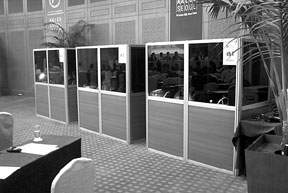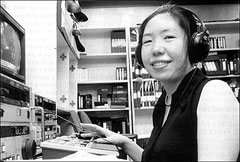HAVE YOU ever seen what goes behind an international conference? Various countries' leaders who speak different languages participate, however every conference progresses smoothly. In a case like this, there is always conference interpreters involved. In Korea, many people know this jobs name as "simultaneous interpreters." However, simultaneous interpretation is merely a way of interpreting, and the official job's name is "conference interpreter." This month, The Yonsei Annals met conference interpreters, Lee Gae-youn (Korean·Arabic) and Yang Mi-son (Korean·Japanese).
What are Conference Interpreters?
Conference interpreters work at conferences that involve non-English speaking attendees. The role of these people is transmitting the contents from one language into another. Conference interpretation is used widely in areas such as business meetings, conventions, sales meetings and press conferences. Usually interpreters sit in soundproof booths listening to the speakers through headphones and interpret into microphones. The interpreted speech is then played to the listener through the allocated headsets. When interpreting is needed for only one or two people, a whispering method is used. The interpreter sits behind or next to the attendee and whispers a translation of the proceedings.
Two types of interpretations 
▲ http://www.winwintrans.com
There are two types of interpretations: simultaneous and consecutive. Simultaneous interpretation requires interpreters to listen and speak at the same time. In simultaneous interpretation, an interpreter begins to translate while a speaker is still talking. As they need a high degree of concentration, simultaneous interpreters work in pairs, with each interpreting for 20 to 30 minutes. In contrast to simultaneous interpretation, consecutive interpretation begins only after the speaker has spoken a group of words or sentences. Consecutive interpreters often take notes while listening to the speakers.
How to become a conference interpreter
Conference interpreters need to study the language that they use for many years. Yang said, "We need to have at least a degree in a particular language. People obtain a master's degree to become an officially recognized interpreter by the Korean government." In Korea, there are two official graduate schools of inter-pretation and translation: Ewha Univ. and Hankook Univ. of Foreign Studies. These schools offer highly intensive practical training for fostering conference interpreters covering a wide spectrum of topics including politics, economics, social affairs, culture, science, and sports.
Additionally, conference interpreters are specialists in communication between people and cultures. So, this job requires the skill to pay careful attention and understand what is communicated between both languages. Moreover, strong research skills, a logical mind, quick mental thinking and a splendid memory are also essential.
Both sides of conference interpreters 
Conference interpreting is a job that can be a strain and yet highly worthwhile. Yang says, "In conferences about politics, there are many sensitive issues which all participants have a different view on. During these conferences, every comment has a delicate meaning. So I need to have a thorough grasp of the flow of the debate. Thus, when working, I am always tense and I always have to prepare beforehand." "There is also another side to the story. Lee states," When the conferences that I participate in end successfully, I feel as if I have played a major part. As a conference interpreter, I am treated like a diplomat during the session, which I appreciate greatly."
Advice to Yonseians
Conference interpreting is all about languages and its connections with people. Developing a way of thinking in two or more languages is the main task. The importance of good language skills is obviously eminent; however appreciating different cultures is also required. Lee says, "Walt Disney once said, Be ready, and then chance will find you. As university students, you should pursue your dream.

